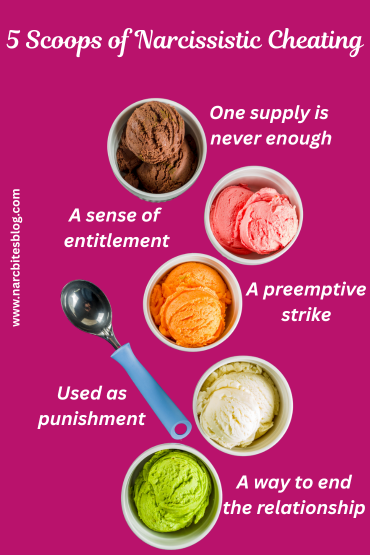What makes a narcissist cheat when everything seems fine? Why do they risk destroying relationships they fought so hard to keep? Why does it feel so deliberate, almost like a game? You might think cheating is about temptation, opportunity, or dissatisfaction. And sometimes, it is. But when it comes to narcissists, cheating isn’t just an act. It’s a pattern. A calculated mechanism. And far too often, it’s mistaken for an impulsive mistake.
Let’s be clear: narcissists cheat differently. They don’t just stray. They betray. And they do it with a psychological logic that’s both disturbing and cold. Understanding why narcissists cheat requires us to look past ordinary infidelity and straight into the hollow core of narcissistic behavior.
Why Narcissists Cheat: It’s About Supply, Not Love
At the heart of narcissistic cheating behavior lies one need: narcissistic supply. That endless craving for validation, admiration, control.
To a narcissist, people are not partners, they are appliances. Tools. And like all tools, once you’re not meeting their ego’s needs, you’re either discarded or replaced.
Why do narcissists cheat in relationships? Because one source of supply is never enough. The more people admiring them, desiring them, or depending on them—the more inflated their sense of self.
Cheating becomes not just an option, but a strategy.
The Preemptive Strike: Cheating Before They’re Caught
Some narcissists cheat not in response to problems, but to preempt them. They anticipate conflict, accountability, or vulnerability and cheat as a form of retaliation before anything even happens. This twisted logic gives them a sense of control over future emotional risk.
You might never raise a concern, never step out of line and still, they cheat. Why? Because they imagined a future scenario where you might have power over them, and they couldn’t bear it. So, they seized the narrative.
This is part of a larger pattern of emotional sabotage. Narcissists will destroy a good thing just to prove they’re the ones in control.
.
Smearing While Cheating
Another tactic narcissists often use is the smear campaign that runs parallel to the infidelity. While they’re cheating, they’re also rewriting the story of your relationship to others. Framing you as cold, unaffectionate, irrational, or abusive.
Why do this? Because it gives them a ready-made justification. It paints them as the victim in the affair, garnering sympathy while betraying you.
The smear campaign also discredits you in advance. So if you discover the affair and confront them, they already have an audience primed to believe that you were the problem all along.
This is deception on a social level. It’s not just cheating. It’s reputation warfare.
The Double Life: Two Selves, Two Realities
Narcissists excel at living double lives. One version of them is the charming, devoted partner. The other? Detached, deceptive, and reckless.
What’s frightening is how easily they can switch between these roles, sometimes within hours. They can cuddle with you at night, then message someone else the moment you fall asleep.
To them, this isn’t hypocrisy. It’s efficiency. Each version serves a purpose. The loving partner keeps you around. The thrill-seeker feeds their addiction to novelty and ego.
And when you finally discover the double life? They’ll accuse you of being paranoid. Or worse, they’ll flip the script so thoroughly you’ll question reality itself.
The Entitlement Mentality: Rules Are for You, Not Them
One of the core traits of narcissism is entitlement. Narcissists don’t believe they’re bound by the same rules as everyone else. Loyalty is something they demand but rarely return.
This sense of superiority fuels their cheating behavior. They believe:
- They deserve more admiration than one person can offer.
- They shouldn’t be limited by monogamy.
- If they’re bored or restless, they have the right to seek excitement elsewhere.
You, however, are expected to remain loyal, trusting, and available. This double standard is a hallmark of narcissistic abuse.
The Cheating as a Weapon of Emotional Torture
Sometimes, narcissists cheat as a form of punishment. If you challenge them, question their choices, or assert a boundary, they’ll cheat to “put you in your place.”
They won’t always tell you they cheated. Sometimes, they want you to suspect it. To feel insecure, jealous, paranoid. That emotional torment becomes a game for them, a test of how much control they still have over you.
And if you beg for reassurance? They withhold it. That withholding becomes more painful than the cheating itself.
This is psychological sadism cloaked in intimacy.
When Cheating Is Their Way of Ending It
Rather than break up or admit they’re unhappy, some narcissists use cheating as a way of destroying the relationship from the inside. They don’t exit relationships directly, they erode them until you’re forced to leave.
Why? Because if you leave, they get to play the victim. They maintain their public image. And they avoid the shame of being the one left.
Cheating becomes a silent message: “You don’t matter anymore.” But it’s also bait, to make you angry enough to do the hard part for them.
In the end, they don’t just cheat on you. They orchestrate your departure.
The Cheating Is Never Isolated
With narcissists, cheating is rarely a single issue. It’s usually the symptom of a larger pattern, emotional withholding, manipulation, gaslighting, and cruelty.
Infidelity isn’t the moment the relationship broke. It’s the manifestation of an already broken bond, one you were likely trying to mend alone.
So when you discover they’ve cheated, what you’re really uncovering is the depth of their deception. The timeline stretches back further than you think. The betrayal began long before the affair.
This is why the cheating hits so hard: because it confirms what your gut was whispering all along.
Narcissists and Post-Cheating Control
After they’re caught, narcissists often use cheating as another way to tighten control. It’s a twisted game of power dynamics. You’re in pain, and they know it but instead of remorse, they offer confusion.
They may suddenly alternate between hot and cold. Saying they love you one moment and ghosting you the next. Or they might insist you take some blame: “You drove me to it.”
And if you’re still emotionally attached, the uncertainty becomes a hook. You may find yourself chasing closure that never comes, because the narcissist has no interest in giving you peace. Only submission.
Cheating as a Bonding Tool with the New Supply
Narcissists often bond with their new partner over their betrayal of you. They craft a story that paints you as the villain and themselves as the wounded party.
This isn’t just slander. It’s strategy.
By turning the new supply into a co-conspirator, they deepen the emotional bond. The cheating becomes a shared secret. A united front. And the new partner is unknowingly enlisted into a psychological war they don’t even know they’re fighting.
When the Affair Becomes a Trophy
In some cases, narcissists don’t just cheat in secret, they flaunt it. Sometimes subtly, sometimes overtly. The new person becomes a trophy—a symbol of desirability, conquest, and dominance.
They may post cryptic social media updates or drop suggestive comments, all designed to let you know, without explicitly saying it, that someone else now occupies their attention. It’s not love. It’s leverage. Their goal isn’t to build a new relationship; it’s to break you down.
And even when they deny any wrongdoing, the performance continues. It’s emotional exhibitionism disguised as innocent coincidence.
Why Narcissists Rarely Feel Guilty for Cheating
You might assume that everyone who cheats feels at least a little guilt. But narcissists? Not so much.
Their emotional world is structured around avoidance of shame, not authentic remorse. And cheating doesn’t typically evoke shame in them, it elicits justification. They reframe the betrayal as a logical consequence of your supposed failures.
This lack of guilt isn’t a bug in their psychology. It’s a feature. If they let themselves feel remorse, they’d have to recognize your humanity. And narcissists spend their lives avoiding precisely that truth.
The Lingering Effects: How Narcissistic Cheating Rewrites Your Brain
Cheating always hurts. But when a narcissist cheats, it’s not just a break in fidelity. It’s a break in reality. Many survivors describe it as a kind of emotional concussion.
You question your memory. Your instincts. Your capacity to judge people. The gaslighting and the emotional manipulation compound the betrayal, often leaving you in a fog long after the relationship ends.
This is not overreacting. It’s the very real trauma response to being psychologically dismantled by someone who once claimed to love you.
Recovering from this isn’t about forgetting what happened, it’s about rebuilding the internal compass that was intentionally shattered.
Can Narcissists Change Their Cheating Behavior?
This is a difficult but necessary question. The short answer? Rarely.
True behavioral change requires self-awareness, accountability, and empathy — three qualities that narcissists tend to lack or resist developing. Even if they temporarily promise fidelity, it’s often part of another manipulation cycle.
Some narcissists may enter therapy, but unless they confront their deeper pathology, any changes tend to be surface-level and short-lived.
If you’re waiting for a narcissist to change, you’re likely putting your healing on hold for a version of them that may never exist.
The Cost of Staying After the Betrayal
Many people stay after discovering infidelity, especially when entangled with a narcissist. And it’s no wonder: the trauma bond, emotional dependence, and hope for reconciliation are incredibly powerful.
But the cost of staying can be profound. Not because you’re weak, but because your nervous system has adapted to instability.
When a narcissist cheats, they don’t just destroy the relationship—they destroy the shared truth that held it together. And they rarely offer closure. Instead, they leave you in a maze of half-truths and eroded confidence.



